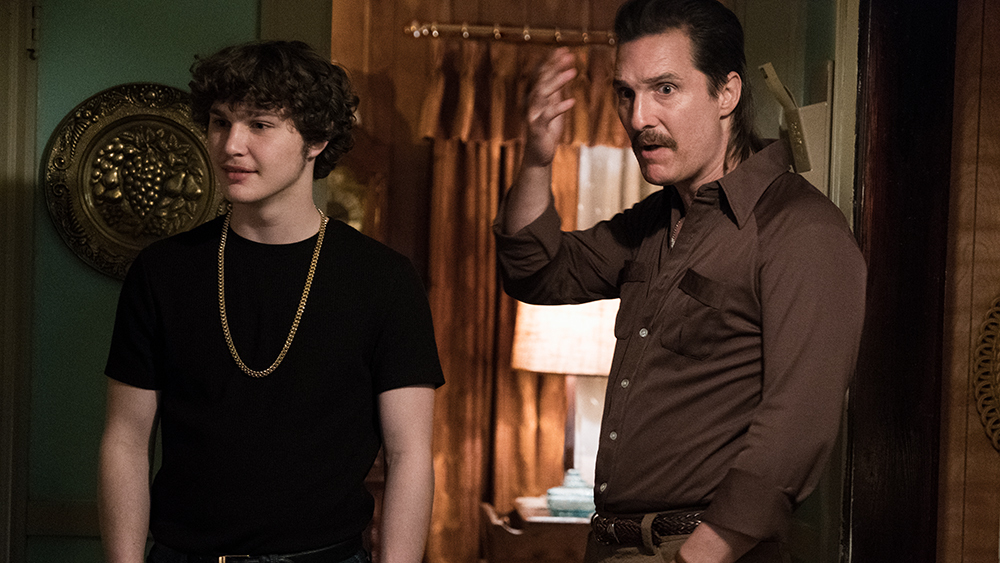
************************This review contains a mild spoiler****************************
“You’d be surprised how easy it is to make a wrong turn, no matter how short the journey is.”
White Boy Rick is based on the true story of Richard “White Boy Rick” Wershe Jr. (Richie Merritt), a teenager from inner city Detroit who in the 1980s was forced to become an FBI informant in order to keep his father Richard Wershe Sr. (Matthew McConaughey) from being prosecuted for illegal gun running. After getting a taste for dealing drugs while acting as an informant, White Boy Rick becomes a kingpin himself in an effort to build a better life for his family.
White Boy Rick’s premise is one that is sure to spark conversation about the injustice and draconian nature of the American justice system. When it is revealed in the film’s closing that Rick stayed imprisoned for 30 years beginning at age 17, while everyone else we meet, including the crooked cops his cooperation helped to convict, got out Lon before, the overly punitive nature of American law and sentencing really hits home. A 17-year old nonviolent offender missed half of his adulthood for a drug crime? Rick is a kid from impossible circumstances that is led to the drug trade both through the manipulation of government agents and those circumstances that aren’t totally his fault. The culpability of the government in guiding Rick’s criminal path serves almost as an allegory for the indirect hand the government played in forming the impoverished background and environment that Rick comes from and allows the drug trade to serve as a viable and attractive path in the first place. Some viewers may take note of the fact that this critique of the American justice system centers the mistreatment of a young white man when in reality, young black and brown men are the most common victims of our country’s heavy-handed punishments. While there is truth in both that reality and the fact that white victims of injustices that are normally confined to the black and brown are often used to drum up sympathy where there would normally be none, White Boy Rick doesn’t feel exploitative while watching it. The point made in the film is stronger than the subject it follows.
Matthew McConaughey is his usual superb self, turning in another golden performance that evokes much emotion. Rick Sr. is at once detestable and sympathetic; making one feel anger for the situations he’s put his children in but sympathy for his attempts to make amends. Bel Powley performs well as Rick’s older sister Dawn strapped by childhood trauma and a drug addiction to cope with it. Richie Merritt ends up being the most questionable actor of the ensemble. His accent as a white boy who grew up in the inner city is believable but he acts it out a little woodenly. It’s not enough to torpedo the film, but it is noticeable. Rapper YG, who was noticeable in the film’s trailers to hip-hop heads, ended up surprising with his performance. Amazingly, he was able to ditch his heavy Compton accent and change his voice. This surprised me as I had assumed his casting was more of the stunt variety and any acting skill would be null and void. However, I left impressed at what he accomplished as a novice with more screentime than a quick cameo.
White Boy Rick can be slow and plodding at times in terms of the flow of its story, made all the more perplexing by how quickly the narrative seems to move. One minute, Rick Jr. is establishing himself as a drug dealer, the next minute he’s a big time kingpin with a reputation, then two scenes later his house is raided and it’s all over. You simultaneously are left wanting more background on how his operation worked as the head of a drug ring, but also left wishing for more urgency in what you were watching. McConaughey is excellent with a good supporting cast and production design, both of which felt authentic. Rick Jr., although feeling a little stiff as an actor, doesn’t hurt the film and is also believable in his role. Ultimately, while the film is decent, it has little lasting effect and is a little forgettable after viewing. Unless you have an overwhelming interest in seeing it, one could stand to wait until its home release to watch.
Image: Columbia Pictures

